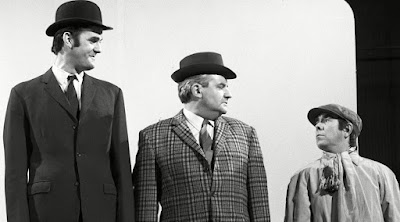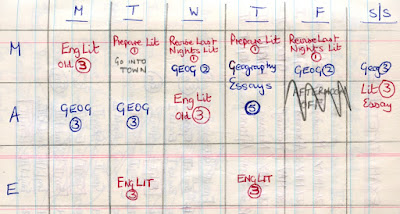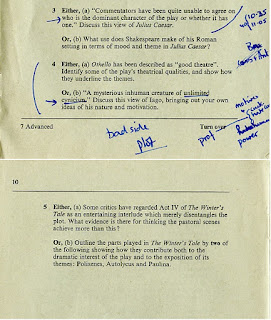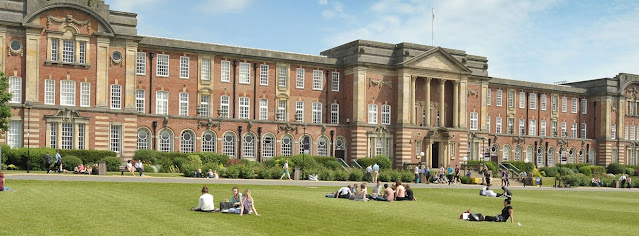New Month Old Post: first posted 19th May 2016
Park Lane College tried to put me off. They maintained the one-year course was only for re-sit students and that the two-year course was more suitable, especially as I had not studied English Literature at any level. Somehow I talked my way in.
It was one of the most difficult courses I have ever done. Selecting and organising all the quotations, literary criticism and conflicting viewpoints into examination-usable form was gruelling, but it was interesting and enjoyable as well, and developed useful skills for later. It was certainly an intense experience because I can still picture the classroom and where we all sat: me at the back.
Most on the course were indeed re-sit students, mainly girls in their late teens, and as late as 1977, in Leeds, there was only one non-white student. The token teenage lad worked at the tax office and told gleeful tales about the persecution of wayward taxpayers. But there were other older first timers. There was an aloof social worker who gazed contemptuously out under her Joanna Lumley ‘Purdey’ fringe and exchanged hardly more than a dozen words with the rest of us all year. There was a bearded chap in his early thirties who said little more, yet managed to give the impression he knew everything already. And luckily, there was a kindred spirit also aiming for university. His grasp of the coursework, huge vocabulary and sweeping command of the English language put mine to shame. It was enormously helpful to be able to discuss things with someone of similar aims and interests.
The syllabus in those days offered enormous, some would say excessive choice. You could get away with covering just two out of three Shakespeare plays, one out of three longer poetic works and four out of sixteen set books. So that’s all we did. It would have been silly to try to cover everything. The course leader, Jonathan Brown, pared things down to what could be achieved in a year. Even within these bounds the exam paper offered a choice of questions.
Do they still let you take the question papers home? They did then, so here they are (click to enlarge images, or get them in PDF form here).
ENGLISH LITERATURE PAPER I (3 hours)
Section A: Shakespeare – Julius Caesar, Othello and The Winter’s Tale.
The rubric was complicated but essentially you had to answer three
questions covering at least two of the three plays. In other words you could
get away with studying only two. We did Julius Caesar and Othello.

First, you had to answer either Question 1 or Question 2, above, which quoted passages from the plays and asked you to address specific issues relating to them. It looks like I did the
Julius Caesar part of Question 2.
Then, questions 3, 4 and 5 were discussion questions on the three Shakespeare
plays. You had to do two, but each offered an either/or choice. I did 3(a) on
Julius Caesar and 4(b) on
Othello.
From the notes made after the exam on the first page, it seems I estimated I had got no more than a C in this paper.
 Section B: Longer Poetic Works
Section B: Longer Poetic Works.
There were three set texts: Pope’s
Epistle to Dr. Arbuthnot, Wordsworth’s
The Prelude and T. S. Elliot’s
East Coker and
Little Gidding, with one question on each. As you had to answer just one of the three questions, we only studied Pope’s
Epistle.
Again, there was an either/or choice within each of question. It looks like I did 6(a).
ENGLISH LITERATURE PAPER II (3 hours)
Novels, Plays and Poetry: four from sixteen set texts.
The syllabus offered sixteen different works, but the examination only required you to answer questions on four, so we covered only four: Jane Austen’s
Persuasion, the selected poems of Gerard Manley Hopkins, the poems of Wilfred Owen, and Arthur Miller’s plays
A View from the Bridge and
All My Sons. Again, the paper had an either/or choice within each question. I think I answered questions 7(b), 10(a), 12(a) and 14(b).
The other twelve items on the Paper 2 syllabus were parts of Chaucer’s
The Canterbury Tales, Marlowe’s
Dr. Faustus, Webster’s
The Duchess of Malfi, Metaphysical Poetry, Defoe’s
Moll Flanders, Sheridan’s
The Rivals and
The School for Scandal, Keats
Lamia and other poems, George Eliot’s
Middlemarch, James Joyce’s
A Portrait of the Artist as a Young Man, Poetry of the Thirties, Patrick White’s
The Tree of Man, and Beckett’s
Waiting for Godot.
ENGLISH LITERATURE PAPER III (2 hours)
Literary Criticism. Two compulsory questions quoting passages from unnamed works followed by lists of points to be addressed.
Paper III was the joker in the pack, impossible to prepare for fully in advance. I really thought I had messed this up.
Question 1: two poems. With the help of the internet I can now identify them as John Stallworthy’s
A Poem about Poems About Vietnam, and Seamus Heaney’s
The Folk Singers.
Question 2: a passage I recognised in the exam as being from George Orwell’s
The Road to Wigan Pier. I remember timidly deciding not to say I knew what it was. I don’t know whether you got extra marks if you did.
Looking back over forty years, Gerard Manley Hopkins’ poetry left the strongest impression. I can still quote Pied Beauty by heart. A lot of people find his poetry dense and unintelligible, so it was a real privilege to be able to take time to dissect and understand his ‘conglomerate epithets’ and obsession with the different roots of the English language. His lines still come back both in moments of elation and despair.
Wilfred Owen too, remains familiar from his regular outings in television programmes and newspaper articles about the First World War. Years later, attending a conference at the Craiglockart campus of Edinburgh Napier University, I could not help but be aware that this was where Owen and Siegfried Sassoon had been treated for shell shock almost a century earlier. Sitting on the lawn in front of the main building, eating lunch in the sun, I imagined they might once have done exactly the same, discussing poetry during Owen’s brief respite from his doomed youth. Sadly, the topic of our own lunchtime conversation was computing.
Arthur Miller revealed a great deal about how plays are put together. I later felt there were more than just situational similarities between the film Saturday Night Fever and A View from the Bridge, although to be strictly accurate they were different bridges.
I was astonished by Alexander Pope’s verbal dexterity and can still remember chunks of the Epistle.
On the other hand, despite my enthusiasm at the time, I am ashamed to say I read no more Shakespeare. I know he was myriad-minded, but it takes effort, and I became too tied up with other things to try.
The same is true of Persuasion, despite the once-or-twice stand-in teacher at Leeds Park Lane College, Mr. Trowbridge, declaring that whenever he felt disheartened there was no better remedy than to go to bed with Jane Austen. He even got a laugh from us with that one.































